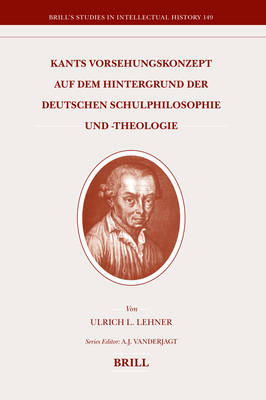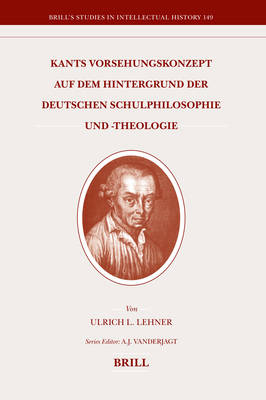
- Afhalen na 1 uur in een winkel met voorraad
- Gratis thuislevering in België vanaf € 30
- Ruim aanbod met 7 miljoen producten
- Afhalen na 1 uur in een winkel met voorraad
- Gratis thuislevering in België vanaf € 30
- Ruim aanbod met 7 miljoen producten
Zoeken
Kants Vorsehungskonzept Auf Dem Hintergrund der Deutschen Schulphilosophie Und -Theologie
Ulrich Lehner
€ 245,95
+ 491 punten
Omschrijving
It is widely agreed that Protestant scholasticism influenced Kant's thinking on the question of Divine Providence. But the nature and extent of that influence have never been explored in detail. This is the scholarly lacuna the present volume seeks to fill. It shows how Kant, from his pre-Critical period onward, grappled with the concept of Divine Providence, sought to subjectivize and naturalize it, and how Protestant scholasticism played an important role, both positive and negative, in this endeavor. It also makes clear how this critical philosophical conversation gave rise to a powerful notion of the progress of the human species - a vital part of the Enlightenment's enduring legacy. This study thus provides not only a unique theological-philosophical overview of 18th-century speculation on the question of Divine Providence; it also sheds important new light on the significance of the German Enlightenment.
Specificaties
Betrokkenen
- Auteur(s):
- Uitgeverij:
Inhoud
- Aantal bladzijden:
- 532
- Taal:
- Duits
- Reeks:
- Reeksnummer:
- nr. 149
Eigenschappen
- Productcode (EAN):
- 9789004156074
- Verschijningsdatum:
- 26/02/2007
- Uitvoering:
- Hardcover
- Formaat:
- Genaaid
- Afmetingen:
- 168 mm x 245 mm
- Gewicht:
- 1124 g

Alleen bij Standaard Boekhandel
+ 491 punten op je klantenkaart van Standaard Boekhandel
Beoordelingen
We publiceren alleen reviews die voldoen aan de voorwaarden voor reviews. Bekijk onze voorwaarden voor reviews.








